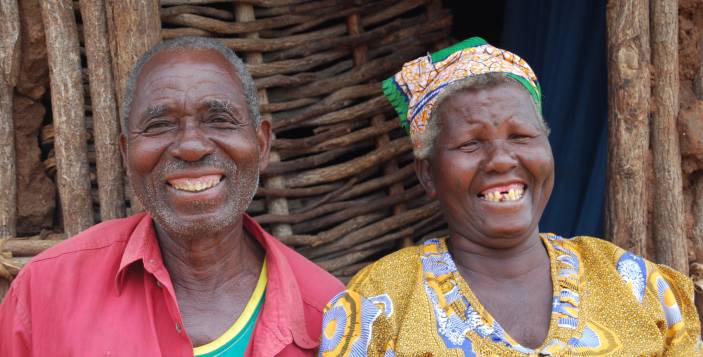
This is the second blog in a three-part series coinciding with our side event entitled Innovations on inclusion at the United Nation’s Commission for Social Development in February 2016. Polly Meeks from ADD International, her colleague Dr Marion Steff from Sightsavers discuss how the implementation of the Sustainable Development Goals must include the excluded.
It’s sometimes said that “the medium is the message”. But in a presentation by the Voices of the Marginalised consortium* at the United Nations (UN) last week, our methods were our message. We believe methods that allow the most excluded voices to be heard are key to realising the 2030 Agenda commitment to leave no one behind.
Persons with disabilities and older men and women living in poverty are among the most marginalised in many communities, and they are often excluded from decisions that affect their lives.
In Bangladesh and Tanzania, the Voices of the Marginalised research project, aims to turn this exclusion on its head. Not only does it listen to the voices of persons with disabilities and older men and women, it also trains them to become researchers – identifying the issues to investigate, gathering the data, and analysing the policy implications. In short, it’s research done with people, not on people.
A unique perspective
One of the advantages of involving the individuals affected is that it helps break down linguistic and cultural barriers, encouraging people to open up in a way that they might not do to outsiders. This in turn allows a deeper understanding of the complex and interlocking ways in which persons with disabilities and older men and women experience marginalisation.
Our research highlighted the relationship between discrimination at household and community levels. For instance, we found cases where community stigma contributed to tensions within marriages. We also found examples where family misperceptions held persons with disabilities back from participating fully in community activities such as schooling.
The research also drew attention to important implementation gaps in government policies. For example, in Bangladesh we found that persons with disabilities and older men and women did not always receive the disability grants and pensions that they were entitled to.
The stories of the persons with disabilities and older men and women who took part in the research were complex, and included positive experiences of empowerment, as well as harmful experiences of exclusion. Nonetheless, across all the stories, a powerful cumulative picture of discrimination emerged. Sadly, the quotes below are typical:
“When I was in primary school, I would tell the teacher that I could not see. I would ask him to read for me. But the teacher would tell me that if I don’t see, why do you come to school then?” said a 25-year-old with a visual impairment from the Tanzania’s Kibaha district.
“My problem is that since I was about 60, I’ve at times found it impossible to eat, and at other times I don’t eat. Sometimes my sons give me a lot, sometimes they don’t,” said a 78-year-old from Cox’s Bazar in south-east Bangladesh.
Keeping recommendations real
By involving people with first-hand experience of the realities of exclusion in the analysis, the recommendations for policymakers are richer and more nuanced.
It’s impossible to do justice to the full range of recommendations in this blog, but for a more in-depth account of the findings from Bangladesh, take a look at our full report. The report on Tanzania will be out later this year.
Still, amidst all the diversity and nuance, many common themes emerged in both countries – the need for fair access to health, education, and livelihoods, and the urgency of raising awareness on the rights of persons with disabilities and older men and women. These findings back up the key recommendations that ADD International, Sightsavers and HelpAge International are putting to policymakers at global level:
- To support the elaboration of a UN Convention on the Rights of Older People and the implementation of the UN Convention on the Rights of Persons with Disabilities.
- To ensure development programmes comply with the Sustainable Development Goals and leave no one behind, gathering disaggregated data to monitor progress.
- To raise awareness on the experiences and rights of persons with disabilities and older men and women to challenge stigma and discrimination.
Most of all, Voices of the Marginalised highlights the importance of giving persons with disabilities and older men and women a central role in decisions that affect them. As the world looks to put the 2030 Agenda into practice, it’s high-time to bring excluded voices in from the wilderness.
Read the other blogs in the United Nations Commission for Social Development series:
- Tony German, Development Initiatives: We need a data revolution that leaves no one behind
- Vappu Taipale, incoming trustee at HelpAge and chair of affiliate Valli: What makes a city age-inclusive?
*The consortium is a collaboration between Sightsavers, HelpAge International and ADD International. Supporting partners during the pilot in Bangladesh were Alzheimer’s Disease International and the Institute of Development Studies. In Tanzania, the supporting partner is Ifakara Health Institute, which is currently leading the research.
